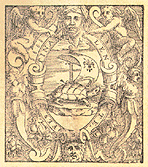Poi che tu dimandi, io son contento
Del tuo comento dir quel che mi pare:
Poco e da pochi commendar lo sento,
Ma ben molto e da molti biasimare;
E vorreber veder nuovo comento
Che'l tuo comento avesse a comentare;
Perchè ci metteria Dante del suo
Senza un comento che comenti il tuo.
[Since you ask, I am happy
To say whatever I think about your commentary:
I hear it praised very little, and by very few,
While I hear it very much blamed, and by very many;
And they would like to see a new commentary
Which ought to comment upon your commentary;
For too much of Dante is lost
Without a commentary which would clarify yours.]
In spite of its perceived limitations, Buonanni's edition is significant
for a number of reasons. First of all, it is the only edition of any part
of Dante's poem to appear in the poet's native city between Benivieni's
Giuntina edition of 1506 and the Crusca Academy edition of 1595. Moreover,
Buonanni's commentary, in its familiarity with and use of Greek literature
as a measure by which to consider Dante, foreshadows the beginning of the
famous "Quarrel over Dante" initiated by the mysterious Ridolfo
Castravilla (a pseudonym), who attacked Dante's 